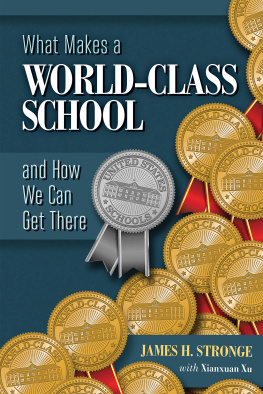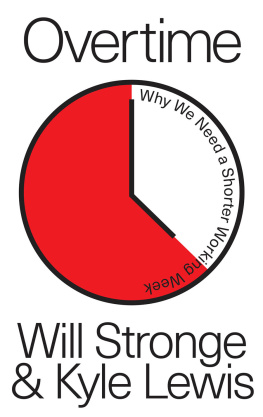James H. Stronge - What Makes a World-Class School and How We Can Get There
Here you can read online James H. Stronge - What Makes a World-Class School and How We Can Get There full text of the book (entire story) in english for free. Download pdf and epub, get meaning, cover and reviews about this ebook. year: 2017, publisher: ASCD, genre: Politics. Description of the work, (preface) as well as reviews are available. Best literature library LitArk.com created for fans of good reading and offers a wide selection of genres:
Romance novel
Science fiction
Adventure
Detective
Science
History
Home and family
Prose
Art
Politics
Computer
Non-fiction
Religion
Business
Children
Humor
Choose a favorite category and find really read worthwhile books. Enjoy immersion in the world of imagination, feel the emotions of the characters or learn something new for yourself, make an fascinating discovery.
- Book:What Makes a World-Class School and How We Can Get There
- Author:
- Publisher:ASCD
- Genre:
- Year:2017
- Rating:3 / 5
- Favourites:Add to favourites
- Your mark:
- 60
- 1
- 2
- 3
- 4
- 5
What Makes a World-Class School and How We Can Get There: summary, description and annotation
We offer to read an annotation, description, summary or preface (depends on what the author of the book "What Makes a World-Class School and How We Can Get There" wrote himself). If you haven't found the necessary information about the book — write in the comments, we will try to find it.
What Makes a World-Class School and How We Can Get There — read online for free the complete book (whole text) full work
Below is the text of the book, divided by pages. System saving the place of the last page read, allows you to conveniently read the book "What Makes a World-Class School and How We Can Get There" online for free, without having to search again every time where you left off. Put a bookmark, and you can go to the page where you finished reading at any time.
Font size:
Interval:
Bookmark:


Chapter 1
....................
world-class (wrldkls) adj. Being among the best or foremost in the world; of an international standard of excellence: a world-class figure skater.
American Heritage Dictionary of the English Language (5th ed., 2010)
According to Merriam-Webster (n.d.), the first known use of the term world-class was in 1950. For more than half a century, and no doubt long before the term was popularized, we've been interested ineven fixated onthe idea of being world-class. This interest is only increasing as societies become increasingly globalized: If you search for the term world-class on Google, you'll receive almost half a billion results! Are we the best? Are we among the best? Are we good enough? These are the questions at the root of world-classness.
Before turning our attention to the issue of world-class schools, let's examine two examples of world-classnessone from the world of sports and one from the world of business.
In an article for McKinsey Quarterly titled "World-Class Teams," David Kirk (1992), former captain of New Zealand's All Blacks rugby team, poses a question fundamental to defining the term world-class: "If world-class teams can be recognized from the outside by a lack of mistakes, an ease of performance that leads to high margins of victory, and a joy in going about their business, what is it about them internally that enables them to perform so well?" Kirk proceeds to provide a set of "qualities of greatness" that transcend his sport and time: vision, ability, divine discontent, and discipline.
Kirk describes vision as "something to believe in, something to achieve, something to become." He continues:
All teams have objectives, and the best teams are clear about exactly what they are, but few have real vision. Objectives are cold, intellectual, rational, believable. Progress toward them is quantified, defined, measured. Visions must be rational, but they are also emotional. They are often distant. They must excite and engage and frighten. They must be big.
Kirk describes two dimensions of vision: one external and one internal. An external visionof winning the World Cup, for examplereflects a desire to be the best in the world at something, whereas an internal vision is one "of realizing potential, of growing, of taking the chance for the team and the members to become what they are able to be."
World-class teams can't exist without world-class players who exhibit abilitya mastery of skills. However, Kirk cautions that although ability is crucial, "so too is complementarity. Teams are created out of the belief that they generate an energy and synergy that make the whole greater than the sum of the parts. In the world-class team, the result is performance that is consistently at or beyond the level that any reasonable person could expect."
In practical terms, divine discontent refers to a tendency toward highly analytical and self-critical behaviors among team memberscontinuously asking, What mistakes did we make? How can we eliminate them? What can we learn from our mistakes? How can we get better? Kirk notes that divine discontent "is an attitude to learning and growth that is never satisfied with past achievements but always searching for the next challenge. It is remarkable how many sports players and teams are perpetually dissatisfied with their performance. After what seems an outstanding performance they appear ill at ease. Outsiders may even think them churlish."
According to Kirk, discipline begins with developing a "set of boundaries that define what is acceptable and unacceptable" regarding even the smallest and most mundane matters (e.g., "It is unacceptable to attend team practice without the correct attire and equipment."). These boundaries are clear and nonnegotiable, so there can be no confusion; everyone on the team knows the rules of the game and sticks to them. "Starting from small beginnings like this," writes Kirk, "the leader should ensure that discipline is applied to communications, team structure, organization, and management. What begins as an external rule does not stay so for long in world-class teams. High performers internalize standards and drive themselves to meet them. This is the essence of true self-discipline, a quality shared by all the best players I knew" (p. 4).
Throughout my life, I've stayed at many hotelssome acceptable, others run-of-the-mill, and, occasionally, a few that were truly outstanding. Although there are many world-class hotel chains, I'd have to give my personal vote to the Four Seasons. This luxury hotel brand has about 100 properties around the world, often located in key international cities and in highly desirable vacation destinations. It is consistently named by Fortune magazine as one of the 100 best companies in the world to work for, and its hotels are routinely listed among the best in the world by such authorities as Cond Nast Traveler and Travel+Leisure magazines.
So what is so special about the Four Seasons? According to Karen Harrison (2014), a luxury travel consultant, it is one of the world's best hotel companies for one simple reason: It does everything well. "The brand claims extremely high guest loyalty because it is consistent," she writes. "Guests expect and enjoy beautiful design; exceptional hotel service; and outstanding dining, spa, and golf options. Four Seasons is not the only luxury hotel brand, or the only one with remarkable service. But Four Seasons' consistency is what gives it an edge" (p. 2).
Four Seasons Hotels Ltd. is headquartered in Toronto, Canada, where it was founded in 1960 by Isadore Sharp, whose family remains active in the management of the company. In a keynote speech delivered at the Entrepreneurship Conference hosted by the Graduate School of Business at Stanford University, Sharp explained that the hotel chain's excellence was rooted in a key decision that he made early on in the company's history: to fire top people who weren't motivated to serve customers above all else. Although Sharp acknowledged that other companies had similar operating philosophies, he noted the key difference: "We enforced it" (cited in Murphy, 2010). Put another way, Four Seasons Hotels Ltd. operates according to the Golden Rule: Treat others the way you would like them to treat you.
In his speech, Sharp continued:
The outcome in our industry normally depends on the front-line employeesdoormen, bellmen, waiters, maidsthe lowest-paid peopleand often, in too many companies, the least motivated. These front-line staff represent our product to our customers. In the most realistic sense, they are the product. When our employees are trusted to use their common sense, they can and do turn mishaps into new service opportunities. Then, what the customer remembers is not the complaint, but the outcome. (Cited in Murphy, 2010)
In sum, the lesson we can learn from the Four Seasons is that any endeavor requires two essential elements for it to be truly world-class: quality product
Font size:
Interval:
Bookmark:
Similar books «What Makes a World-Class School and How We Can Get There»
Look at similar books to What Makes a World-Class School and How We Can Get There. We have selected literature similar in name and meaning in the hope of providing readers with more options to find new, interesting, not yet read works.
Discussion, reviews of the book What Makes a World-Class School and How We Can Get There and just readers' own opinions. Leave your comments, write what you think about the work, its meaning or the main characters. Specify what exactly you liked and what you didn't like, and why you think so.









